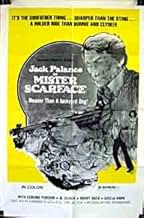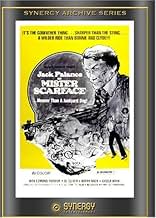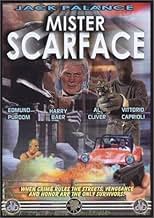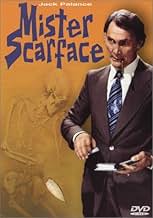IMDb-BEWERTUNG
6,1/10
1228
IHRE BEWERTUNG
Füge eine Handlung in deiner Sprache hinzuTwo small-time hoodlums plot to get even with a treacherous boss who is intent on monopolizing all criminal activity within Rome.Two small-time hoodlums plot to get even with a treacherous boss who is intent on monopolizing all criminal activity within Rome.Two small-time hoodlums plot to get even with a treacherous boss who is intent on monopolizing all criminal activity within Rome.
Carmelo Reale
- Luca
- (as Roberto Reale)
Raul Lovecchio
- Manzari Goon
- (as Raul Lo Vecchio)
Erigo Palombini
- Manzari Goon
- (as Enrico Palombini)
Empfohlene Bewertungen
I had first watched this on the big screen as part of the Italian B-movie retrospective held during the 2004 Venice Film Festival (where 6 features by Di Leo were shown); back then, I didn't like it - rating it ** and feeling that it was rather unbalanced by the vulgar comedy relief (though typical of Italian films during this era), especially when compared to the director's other relatively more sober stuff (which had proved my first encounter with his work)!
Watching it again as part of a mini-tribute to its star, Jack Palance (who passed away recently), I found myself a lot more receptive to it; Di Leo dabbled most often in the crime genre and, as can be deduced from the title, this one falls into that category: the plot, dealing with a gang war (one faction controlled by Palance and the other by Edmund Purdom), is no great shakes but, at its centre is a revenge plan involving Palance and young misfit Al Cliver (whose identity is unknown to the 'boss'); this element gives it an undeniable edge, and the exciting climax takes place at a massive abandoned slaughterhouse - where an old betrayal and murder had taken place.
As is typical of the director, the action is pretty constant and always dynamic - aided by a fine eclectic score by Luis Enrique Bacalov; there's a discreet amount of nudity and, as I said, a slight overdose of comedy: however, as I watched more films by Di Leo (totaling nine so far), I realized that this was basically an idiosyncrasy of his (evident even in a straight melodrama such as LA SEDUZIONE [1973]) but, in any case, I generally appreciated its style of humor now - especially when delivered by Di Leo regular Vittorio Caprioli (my favorite bit occurs towards the end, when he shoots the bad guys at close range with a bunch of guns he purchased for an eventual showdown but, constantly missing the mark, reasons to himself that the weapons must be defective and, therefore, he ought to return them and file a complaint to boot!).
Palance is suitably sinister and imposing - even if he probably spends more time being had, so to speak, than dishing it out! In the end, what's missing from the film vis-a'-vis Di Leo's other genre work is a strong hero (i.e. a credible opponent to Palance) in the vein of Gastone Moschin (from THE CONTRACT [1972]), Mario Adorf (from THE Italian CONNECTION [1972]) and Henry Silva (from WIPEOUT! [1973])...
Watching it again as part of a mini-tribute to its star, Jack Palance (who passed away recently), I found myself a lot more receptive to it; Di Leo dabbled most often in the crime genre and, as can be deduced from the title, this one falls into that category: the plot, dealing with a gang war (one faction controlled by Palance and the other by Edmund Purdom), is no great shakes but, at its centre is a revenge plan involving Palance and young misfit Al Cliver (whose identity is unknown to the 'boss'); this element gives it an undeniable edge, and the exciting climax takes place at a massive abandoned slaughterhouse - where an old betrayal and murder had taken place.
As is typical of the director, the action is pretty constant and always dynamic - aided by a fine eclectic score by Luis Enrique Bacalov; there's a discreet amount of nudity and, as I said, a slight overdose of comedy: however, as I watched more films by Di Leo (totaling nine so far), I realized that this was basically an idiosyncrasy of his (evident even in a straight melodrama such as LA SEDUZIONE [1973]) but, in any case, I generally appreciated its style of humor now - especially when delivered by Di Leo regular Vittorio Caprioli (my favorite bit occurs towards the end, when he shoots the bad guys at close range with a bunch of guns he purchased for an eventual showdown but, constantly missing the mark, reasons to himself that the weapons must be defective and, therefore, he ought to return them and file a complaint to boot!).
Palance is suitably sinister and imposing - even if he probably spends more time being had, so to speak, than dishing it out! In the end, what's missing from the film vis-a'-vis Di Leo's other genre work is a strong hero (i.e. a credible opponent to Palance) in the vein of Gastone Moschin (from THE CONTRACT [1972]), Mario Adorf (from THE Italian CONNECTION [1972]) and Henry Silva (from WIPEOUT! [1973])...
Rulers of the City does have a lot going for it. It does fall short of being great, and Fernando Di Leo and Jack Palance have done better in their respective careers, but this is not even close to being career-worsts for either and is a very respectable film overall.
The locations are splendid, and the gritty roughness of the photography and clever (without being too much or too dizzying) camera angles capture it more than ideally. There is also a dynamite score, exhilarating action scenes (the final shootout being the prime example) and mostly above-decent direction, if in need of more tension in places. The script is tight and more light-hearted than Di Leo's Milieu trilogy, but it was light-heartedness and witty humour that didn't feel too misplaced, and the story is at least engrossing and swiftly paced on the most part.
Casting-wise, Rulers of the City is very much a mixed bag, with the best performances being from a sinister Jack Palance (though he was deserving of more screen time) and a lively and lots-of-fun, without being too clownish, Vittorio Napoli as the film's most colourful character. Harry Baer has some charming moments too and Giselda Hahn brings a little heart. Al Clivar however does show his limitations as an actor in a somewhat one-note performance and Edmund Perdum is rather stiff in an underwritten role.
Aside from a slow-motion dream-like opening sequence, that was quite striking if perhaps not necessary, Rulers of the City does take too long to get going and the story only really comes to life once Palance appears. The film was in need of more tension and suspense, and stronger writing for the villains (who were underutilised and never really developed, and this is including Palance's character) would have helped. The final shoot-out is great, but ends a little anti-climactically. And I do have to agree about the homo-erotic undertones and homosexuality hints being clumsily written and out of place, which did feel the film a bizarre feel at times.
Overall, respectable but could have been better. 6/10 Bethany Cox
The locations are splendid, and the gritty roughness of the photography and clever (without being too much or too dizzying) camera angles capture it more than ideally. There is also a dynamite score, exhilarating action scenes (the final shootout being the prime example) and mostly above-decent direction, if in need of more tension in places. The script is tight and more light-hearted than Di Leo's Milieu trilogy, but it was light-heartedness and witty humour that didn't feel too misplaced, and the story is at least engrossing and swiftly paced on the most part.
Casting-wise, Rulers of the City is very much a mixed bag, with the best performances being from a sinister Jack Palance (though he was deserving of more screen time) and a lively and lots-of-fun, without being too clownish, Vittorio Napoli as the film's most colourful character. Harry Baer has some charming moments too and Giselda Hahn brings a little heart. Al Clivar however does show his limitations as an actor in a somewhat one-note performance and Edmund Perdum is rather stiff in an underwritten role.
Aside from a slow-motion dream-like opening sequence, that was quite striking if perhaps not necessary, Rulers of the City does take too long to get going and the story only really comes to life once Palance appears. The film was in need of more tension and suspense, and stronger writing for the villains (who were underutilised and never really developed, and this is including Palance's character) would have helped. The final shoot-out is great, but ends a little anti-climactically. And I do have to agree about the homo-erotic undertones and homosexuality hints being clumsily written and out of place, which did feel the film a bizarre feel at times.
Overall, respectable but could have been better. 6/10 Bethany Cox
Energised to some degree by some inspired acting, this violent little crime caper has a young, carefree protection collector (Baer) swindling a big-time hood (Palance) out of 10 million Lira only to discover that his "good deed" has deadly consequences for all concerned. His alliance with a former gang member of the hood (Cliver) may be the only chance he has to clear his debts, and survive, but there's another motivation for Cliver's expert assistance.
Palance is wasted talking out the corner of his mouth while he incessantly chews on a durry filter, while poor old Edmund Purdom really has things tough in this film. His character is publicly emasculated and betrayed by his own favoured son. The role isn't especially prominent, nor key to the plot, so Purdom's appearance in it is both unusual (for such a distinguished actor) and ultimately frivolous. Baer is likable as the charismatic "enforcer", who attracts as much attention from the ladies as he does from those attempting to kill him. Rotund funny-man Caprioli as the wily old Purdom gang member over-indulges in the humour, becoming a parody. Overall, it's very hit and miss.
There's not much to recommend; lots of fisticuffs, gun-fights, car-chases and the like, but the tongue-in-cheek element is never consistently applied, and consequently, the tone is confusing, the film itself a dull experience.
Palance is wasted talking out the corner of his mouth while he incessantly chews on a durry filter, while poor old Edmund Purdom really has things tough in this film. His character is publicly emasculated and betrayed by his own favoured son. The role isn't especially prominent, nor key to the plot, so Purdom's appearance in it is both unusual (for such a distinguished actor) and ultimately frivolous. Baer is likable as the charismatic "enforcer", who attracts as much attention from the ladies as he does from those attempting to kill him. Rotund funny-man Caprioli as the wily old Purdom gang member over-indulges in the humour, becoming a parody. Overall, it's very hit and miss.
There's not much to recommend; lots of fisticuffs, gun-fights, car-chases and the like, but the tongue-in-cheek element is never consistently applied, and consequently, the tone is confusing, the film itself a dull experience.
Charming movie. Fun and entertaining poliziottesco that doesn't take itself too serious. The Italian DVD is wide screen and includes the superior Italian dub (with English subtitles); don't see the American crappy DVD's that are out there. It also has nice extra's and even those are subtitled. Hail to Raro Video. The soundtrack is strange and original. And it works quite well. I wonder if it is out there on CD. The big name is of course Jack Palance, but my favorite character in the movie is Napoli, played by Vittorio Caprioli. Perhaps not one of Fernando Di Leo's best, but very entertaining indeed. Underrated by the IMDb-users, probably because of the horrible American DVD's.
Fernando Di Leo's 1974 'Rulers of the City' is a delightful find among the gems of Italian cinema. The film is fast paced. It is, in hindsight, a gentle send up of the gangster genre. Remember took his treatment of spaghetti westerns to the urban turf, and, under all the grime and grit, he brings a comic turn. The cast is international: Harry Baer (Tony)is German; Jack Palance (Mr. Scarface)American; Al Cliver a Cairo-born Italian; and Vittorio Caprioli (Napoli) Italian. All things considered, it should come as no surprise that a German should appear in an Italian film. Remember, Visconti's casting of Alain Delon and his lover Helmut Schmidt. Italy was a haven for Americans: Italian directors brought out the hidden talent of some actors rarely seen in America. Richard Basehart in Fellini's 'la Strada'or Clint Eastwood who found an exit from a dead-end career in the US in Leone's spaghetti westerns as did Lee Van Clef. De Leo used well the image of Palance's face which incarnates the evil of loan sharks, and within he got an actor who could speak Italian. Baer brings the youthful elan of wanting to make it big and quick as a 'tax collector' though his fists and his intelligence. Cliver with a face of a fallen angel seeks revenge with a natural quickness and understanding of a finely tuned intelligence. And of course in Caprioli, he well used a finely turned the finely tuned sense of comedy and the wiliness of an old fox. The film opens up with a dreamlike sequence that as the quickly paced story is the key to its denouement. There is only one thing for you to do: rush out, find a copy of 'Rulers of the City', sit back and enjoy it!
Wusstest du schon
- WissenswertesIntroductory line to the title character's introductory scene, upon Scarface's entry into the club: That's "The" Scarface. He's bad news, I can tell you. Just looking at him and my asshole twitches.
- PatzerIn the final chase scene, the passenger fires a gun through the windshield, at the motorcycle they are chasing. The window is not shattered after many shots fired through it.
- Zitate
Vincenzo Napoli: [upon Scarface's entry into the club] That's "The" Scarface. He's bad news, I can tell you. Just looking at him and my asshole twitches.
- Alternative VersionenGerman VHS version was cut by ca. 8 minutes.
- VerbindungenFeatured in Italian Gangsters (2015)
Top-Auswahl
Melde dich zum Bewerten an und greife auf die Watchlist für personalisierte Empfehlungen zu.
- How long is Rulers of the City?Powered by Alexa
Details
- Laufzeit1 Stunde 28 Minuten
- Seitenverhältnis
- 1.85 : 1
Zu dieser Seite beitragen
Bearbeitung vorschlagen oder fehlenden Inhalt hinzufügen





























